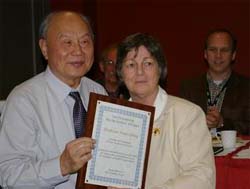
CAS marine biologist honored with a prize by US National Shellfisheries Association
In recognition of his valuable work to the marine shellfish farming research, Prof. ZHANG Fusui, a marine biologist and aquaculture expert from the CAS Institute of Oceanology, was honored with a prize of outstanding contributions by the US National Shellfisheries Association on 1 March.
Prof. Zhang, a member of the Chinese Academy of Engineering, is an aquatic farming scientist of international renown and the major founder of molluscan aquaculture and stock enhancement biology, as well as molluscan aquaculture industrialization in China. In the earlier years of his career as a marine farming specialist, he was engaged in faunistic studies of marine mollusca and pioneered in the study of pelagic molluscs in China, making substantial contributions to the rise of China's marine farming industry, molluscan zoogeographical theory, laying a solid foundation for the ensuing successful transplant of the bay scallop into China.
In the 1970s, Zhang devoted himself to the study of experimental ecology and took the lead in the study of enhanced aquaculture biology. Systematic studies were carried out to reveal the reproduction and growth patterns of Bohai and Yellow Sea mussels. He developed the first successful protocols for hatchery production of mussel seeds and the technique for the establishment of natural seed mussel bed, resulting in the rapid growth of the mussel culture industry in China. By inventing the industrialized knowhow of the seed cultivation, he created a world record in this aspect, leading to an unprecedented upsurge in the mussel-breeding rush along Chinese coastline and culminating to China's yielding of the highest annual mussel output volume in the world at the end of the 1980s. In the 1980s, Zhang, for the first time, selected and successfully introduced bay scallops from the USA Atlantic coast into China. Based on his experiences in solving the major biological and ecological problems of bay scallops transplantation in China's coastal area, he developed and popularized a package technology to produce the species throughout its complete life cycle including hatchery-production of seeds and growing-out on an industrial scale. He is credited with the establishment of the first and the largest bay scallop mariculture industry ever known in the world based in north China's coastal regions. In the 1990s, Zhang successively introduced a variety of geographic populations of another subspecies of the bay scallop to the South China Sea and the East China Sea. Modifications in culture protocols and technology were developed to suit the local conditions, resulting in industrialization of this subspecies.
By 2003, the aggregate output volume of the bay scallop in China accumulated to 5.2 million metric tons (with shells), and the success was acclaimed one of the most brilliant feats in the massive ex-situ introduction of a marine-life species. In addition, he hosted the successive work to introduce different species of the bay scallop to South China Sea, East China Sea and the Rim around the Bohai Sea in the 1990s. In recent years, he shifted his research focus to the cultural species germplasm, diseases, environmental protection and seafood's quality and designed a lot of workable measures for maintaining the sustainable development of Chinese mariculture, including his development and advocacy of the off-shore culture approach.
In succession during his fruitful career in the past decades, he received a dozen of S&T awards, including a first-grade prize from the National Awards for S&T Progress, a prize from the CAS Awards for S&T Progress, the Supreme S&T Awards bestowed by the Shandong Province, a first-grade prize from the province's Awards for S&T Progress.







